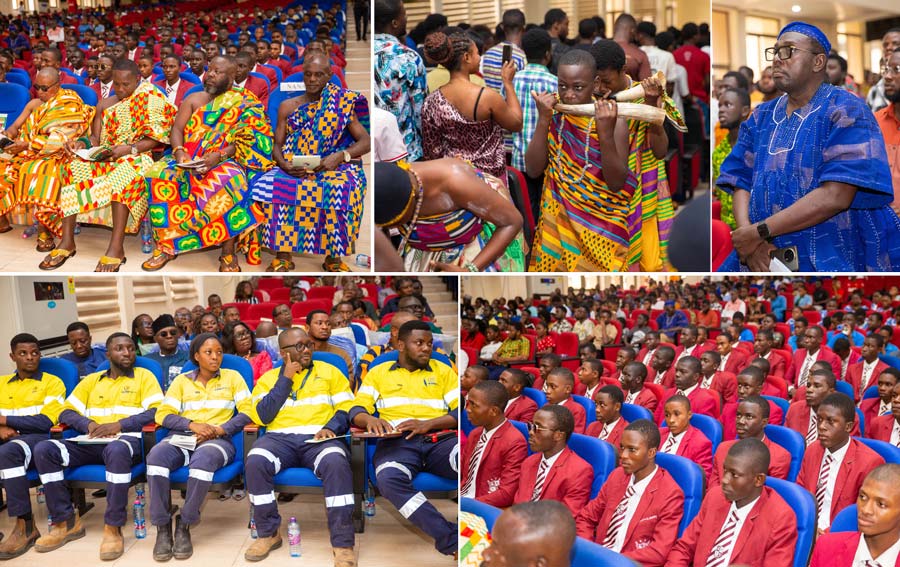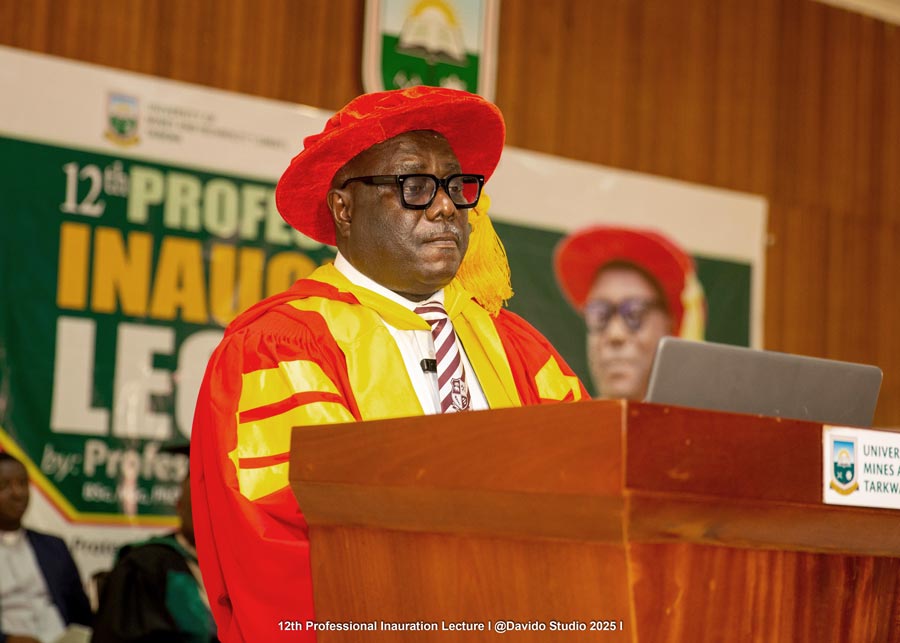Professor Anthony Ewusi, a renowned hydrogeologist and Dean of the Office of International Programmes (OIP) at the University of Mines and Technology (UMaT), has called for urgent measures to safeguard Ghana’s groundwater, warning that the nation’s most widely used freshwater source is under increasing threat from pollution, land-use pressures, and unregulated mining activities especially in the Tarkwa-Nsuaem Municipality. He made this call during his inaugural lecture titled, “Protecting the invisible, hidden treasure beneath our feet,” on Thursday, 11th September 2025.
Prof Ewusi emphasised that groundwater sustains millions of Ghanaians, with about 40 percent of households depending on it for daily use. In rural areas, he stated that reliance had risen to nearly 59 percent, while in urban areas it stood at about 26 percent. Despite this critical role, Prof Ewusi cautioned that groundwater is being threatened by unregulated land-use and widespread mining-related pollution, especially ‘galamsey’ in communities within the Tarkwa-Nsuaem Municipality.
“Groundwater is both indispensable and dangerously vulnerable,” he noted, stressing that failure to take appropriate measures could compromise public health and long-term water security.
Sharing findings from his research titled “Impacts of Mining Activities on Groundwater at the University of Mines and Technology Campus, Tarkwa: Implications from Groundwater Monitoring, Quantity, Quality and Human Health Risk Assessment,” Prof. Ewusi revealed that acid mine drainage and mining wastes have significantly altered the chemistry of rivers and wells. He added that elevated levels of arsenic and iron were detected in samples from the Bonsa River and Efuanta areas in the Tarkwa-Nsuaem Municipality, while low pH readings confirmed the corrosive effects of mine drainage. Testing of water, soils, and vegetables also revealed alarming accumulations of arsenic, nickel, lead, and mercury. In several cases, the average daily intake and hazard quotient for these metals exceeded permissible safety limits.
“The study shows unacceptable non-cancer health risks from contaminated vegetables and unacceptably high cancer risks from long-term exposure through drinking groundwater, consuming polluted crops, and contact with affected soils,” Prof. Ewusi cautioned, calling for regular monitoring of water sources and food crops.
Beyond contamination, Prof Ewusi explained that intensified mining activities since 2017 has degraded vegetation cover, accelerated soil erosion, and expanded impermeable surfaces, worsening flood risks in the Tarkwa-Nsuaem. Municipality. These landscape changes, he said, create fractured rock pathways that allow contaminated mine drainage to travel quickly into household wells. He noted that wells located near these fractured zones recorded the highest arsenic and iron levels, showing a direct hydrogeological link between mining operations and water quality in homes.
To ease the Tarkwa-Nsuaem growing water supply challenges, Prof. Ewusi proposed harnessing large volumes of water stored in abandoned underground mine shafts. Citing the Abontiakoon Vertical Shaft of Gold Fields Ghana Limited, he estimated recharge rates of more than 2,500 m³/day, with total volumes equivalent to six million gallons daily which could meet nearly 30 percent of the current water supply deficit in the Municipality. He also added that such water is likely to require minimal treatment and could be tapped at relatively low cost.
Prof Ewusi compared Ghana’s situation with experiences in Europe referencing the UK’s 2001 Foot-and-Mouth disease response, where mass disposal sites created long-term groundwater contamination risks, as a warning against poor planning. He also pointed to Germany’s proactive emphasis on protection, monitoring, remediation, and nature-based solutions such as artificial recharge and riverbank filtration. He recommended that Ghana adopts artificial and bank infiltration water production as done in Berlin as part of precautionary management approaches.

Prof Ewusi proposed a multi-tiered framework for Ghana that includes comprehensive groundwater vulnerability assessments, expanded monitoring networks, detailed aquifer mapping, and integrated groundwater resources management across universities, municipalities, and national agencies.
He further urged mining companies and investors to incorporate hydrogeological risk into their planning and investment decisions, warning that the pursuit of mineral wealth should not come at the expense of community health and long-term water security.
Prof Ewusi struck a balance between urgency and optimism highlighting that SDG 6 on clean water and sanitation for all is achievable, but only if groundwater is prioritised in policy, planning and practice. “We never know the worth of water till the well is dry,” the lecture reminded the audience and underscored that the “invisible, hidden treasure” beneath our feet must be made visible through science, monitoring and governance.











